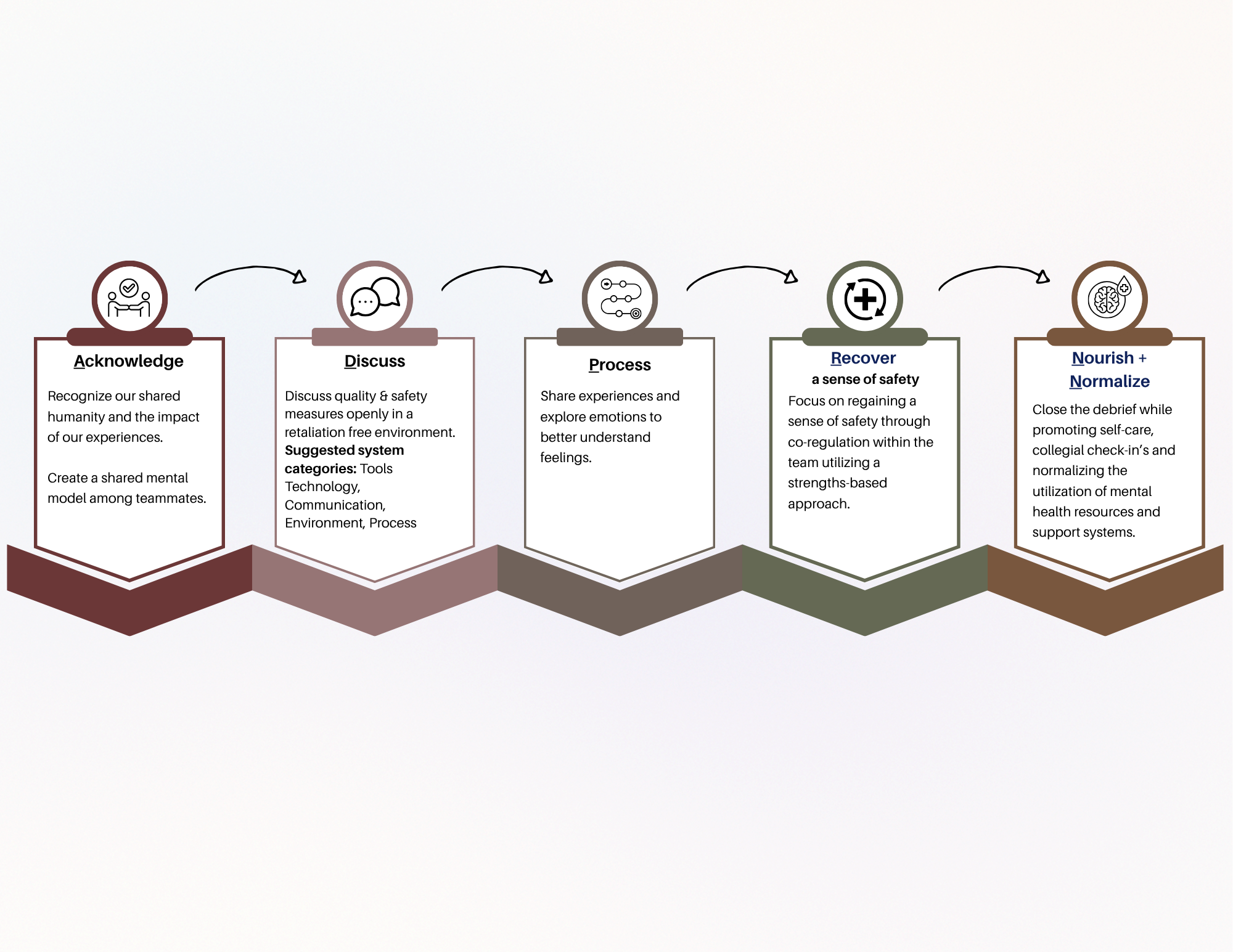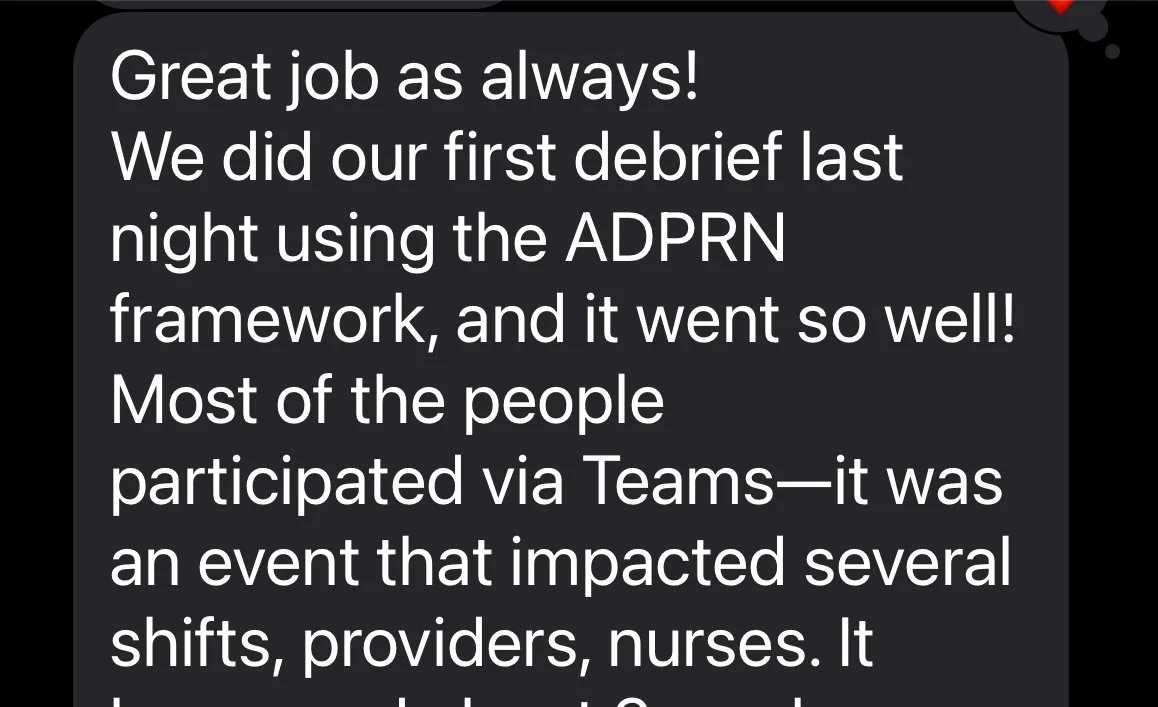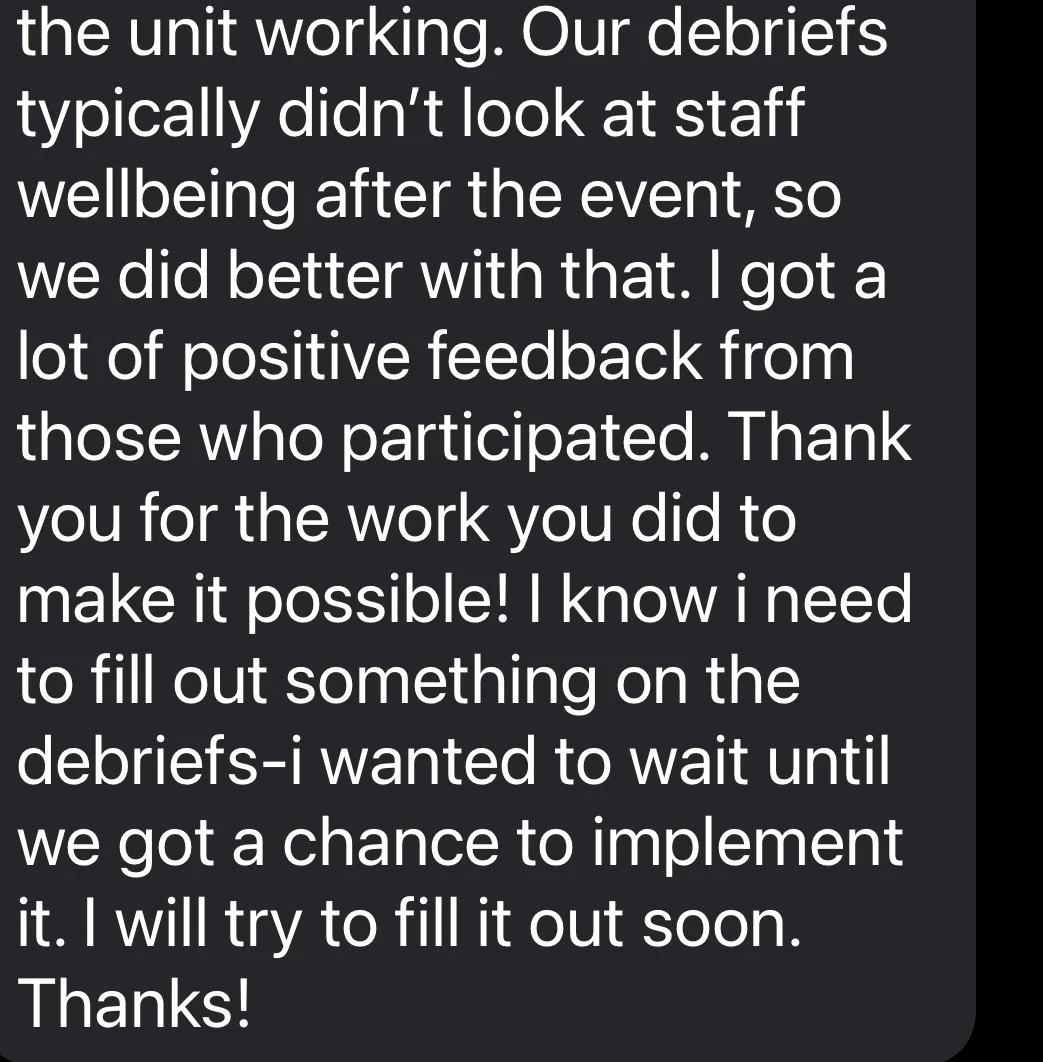
Beyond the Surface:
Debriefing for Sustainability in Healthcare
Full day, small group Debriefing Training
August 15, 2025 // 9am - 3:30pm TheStarTUp at the Armory
307 Washington Avenue. Towson, Maryland 21204
Learn more about location and its history.
Trauma becomes cumulative in the absence of support. This directly influences the ability to cope effectively and may result in leaving the profession (Sheen et al., 2022; Shorey et al., 2022). Several studies have shown that nurses and health care providers desire support after a serious event, yet organizations often offer inadequate emotional support (Burlison et al., 2017; Crawford & Williams, 2024; Shorey et al., 2022).
Debriefing invites you to be a part of the solution.
The existing literature tends to be grouped into either guided team discussions to support learning for future outcomes or structured clinical debriefing strategies designed to minimize the psychological consequences of traumatic events. Both have the potential to influence the well-being and experiences of healthcare workers (Evans et al., 2023).
The ADPRN Debriefing Framework for Healthcare Workers™️ does both.
It invites you to reimagine debriefing by joining learning outcomes focused on quality and psychological safety as a means to foster retention, well-being and safety for staff and patients alike.
The ADPRN Framework is designed for clinical implementation by staff, leaders, managers, directors, hospital-based unit educators, academic clinical and simulation faculty across all disciplines.
ADPRN serves as a guide for healthcare workers during debriefings, emphasizing the importance of Acknowledging our humanity, openly Discussing quality and safety measures in a retaliation free environment, Processing experiences and emotions while focusing on Recovering a sense of safety through co-regulation in a peer-to-peer environment thus Nourishing oneself and Normalizing the use of supportive mental health resources to ensure healthcare workers can care for themselves and provide dignified, safe, quality patient care.
Currently in 13 units across the state of Maryland with 88 facilitators trained and growing!
|
Currently in 13 units across the state of Maryland with 88 facilitators trained and growing! |
Learn more about how we got here by viewing our timeline!
Join us individually and take the ADPRN Debriefing Framework back to your unit as a site champion
or
Attend as team
Both offer support to build a debriefing program within your unit, department or system.
This training provides a guide, script and framework to normalize the use of support resources and enhance the well-becoming of individuals, units + systems.
Plan Ahead Pricing
Price increase to $240 after June 20th.
Price increase to $300 after July 7th.
Investment + Registration
Paid In Full
$300
Payment Plan
2 payments of $150
Student Pricing
Intended for undergraduate and graduate health profession students
(must register with a .edu email address to qualify)
$175
Registration closes August 5th.
Professionally bound and printed Debriefing Toolkit + digital download
5.0 CNE contact hours from Debriefing the Front Lines, Inc.
Nutritious meal: Light breakfast and lunch
Afternoon Coffee + Greek Dessert Table
*BONUS: Optional Virtual Office Hours 4 and 8 weeks post training to discuss barriers, challenges, solutions and successes surrounding implementation.
Customized packages available if support is desired beyond this offering.
Nursing Professionals will earn 5.0 contact hours through Debriefing the Front Lines, Inc. for attending. Debriefing the Front Lines is an accredited providing of continuing nursing education and professional development. Nursing Provider Number: LT0308-0621.
Registration Includes
Register by August 5th to reserve your spot!
Interested in attending? Inquire about CE employer based tuition reimbursement.
Don’t forget to invite your colleagues to be a part of the solution, spread awareness and bring debriefing as a national recourse for healthcare workers.

Meet the Faculty
Tara and Maggie have worked together as consultants supporting the Maryland Patient Safety Center in numerous Trauma-Informed Leadership Trainings and a statewide Perinatal Debriefing Initiative.
Tara Ryan Kosmas
she /her
MSN, RN, NC-BC, CHSE, SOAR
Founding Executive Director, Debriefing the Front Lines
Life as a burn survivor shaped Tara’s experience and led her to the nursing profession. Tara’s experience spans 21 years and includes burns, academia, peer support and debriefing.
Just 16 days after a global pandemic was declared, one by one Tara began Debriefing the Front Lines.
Debriefing the Front Lines has facilitated over 4,000 1:1 sessions for those navigating single incident and Cumulative Care Taking Trauma®
Since leaving academia, Tara and her team have become well-known advocates in the mental health space as they work to bring debriefing as a national resource and standard of practice for health care workers.
When not working with 1:1 clients, Tara is leading CE workshops, speaking, collaborating with hospital partners and managing the day to day operations of Debriefing the Front Lines.
“As the scope of trauma changes, so must the way we approach post-traumatic response recovery. Debriefing is the touchstone to help us in being honest about the facts and processing our emotions while simultaneously working towards systems and policy change”
Maggie Runyon
MSN, RNC-OB, CYT-500
Maggie Runyon (she/her) is a nurse, educator, writer, and speaker.
She began her nursing career in 2009 and has since practiced in hospitals and communities around the country, primarily in labor and birth environments. Maggie is currently pursuing her PhD in Nursing and loves educating, mentoring, and learning alongside other nurses. She recently published her first book, I Thought I Was Here to Help: Unveiling the Healthcare System, Unleashing the Nurse Advocate, which chronicles her early career journey and the lessons she has learned through it.
Her advocacy focuses on improving perinatal care in hospital environments through trauma-informed care, community collaboration, and reflection on nurse identity. When she's not dreaming up good trouble with other changemakers, she's doing yoga, reading a book, traveling, indulging in delicious food, soaking in fresh air outside, or hanging with her awesome partner and kids.












